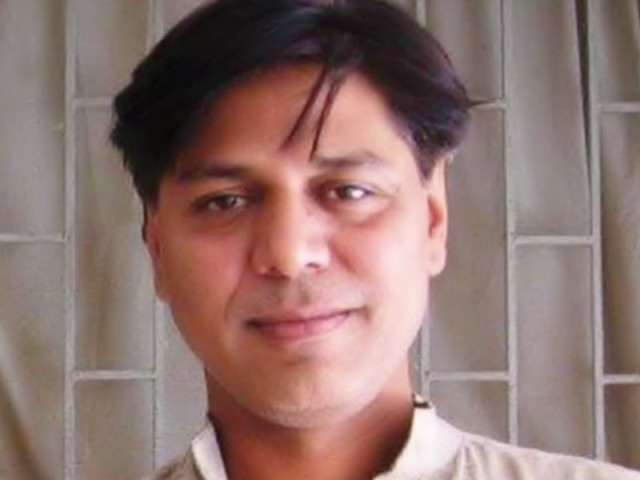Transitions: Sindhi poet Hassan Dars dies in car crash
Fellow poets remember him for his ‘innovative streak, flair, and love for Sindh’.

Hassan Dars, an innovative poet responsible for a new diction in Sindhi poetry by fusing traditional and modern styles, passed away on Thursday at the age of 45.
Around 3 am, Dars’s car crashed against a footpath near Hosh Muhammad Flyover in Qasimabad. Although his relatives did not allow an autopsy, doctors believe that Dars died of a cardiac arrest due to the impact of the crash.
The prolific poet composed thousands of poems but they were never published in book form. His poems appeared, however, in newspapers and magazines or were heard by fans over the television and radio. He was an expert with metaphors and his genre was mostly romantic poetry, so much so that he was regarded as ‘the poet of young hearts’ by the late Shaikh Ayaz, a 20th century Sindhi poet. His fans called him “the best poet after Shaikh Ayaz”.
Dars also made regular appearances on Sindhi television channels and did radio programmes. In 1985, he joined as an editor of the Sindhi daily newspaper, ‘Sawal’, for five years. Recently, he became involved with a non-profit organisation called the Indus Foundation.
From a desert inhabited by Thari folks to fisherman that live along the Indus Delta, Dars’s works provided his readers insight to the diversity of Sindhi culture. The mainspring subject of his affection was his native village of Mashaikh Hothi, 70 kilometres north of Hyderabad in Tando Allahyar district, where he was laid to rest. Thousands of people from all walks of life converged at the poet’s burial, noted Taj Joyo.
Greatest is thy name who created the world
He created the universe for His beloved
Village Mashaikh Hothi is near the resting place of Shah Bhittai
Dars Hassan’s boundary confined between the two places
He who saw love has seen fire in thirst
His friends and fans were as upset as his family on hearing the news of his death. “We have become orphans,” cried Bakshan Mehranvi, a poet and Dars’s childhood friend. He wept relentlessly as he recalledthe days of their companionship.
According to Mehranvi, Dars was a precocious child who began writing poetry in class 9.
“People could not believe the poems were the work of an adolescent. The ideas embodied in his work reflected wisdom much beyond his age.”
Dars portrayed the colours of Sindh in his poetry, which radiate his love and respect for his motherland, he added.
Sindh is like shadow of the beloved
reflected on the deep sub-soil water
Much as an idyllic dream that fills
as a reverie in the eyes
“Dars’s poetry surpasses the work of his contemporaries including, Ayaz Gul Adal Soomro, Taj Joyo, Iqbal Rind and Mazhar Laghari,” argued poet Akash Ansari. For Ansari, it was Dars’s innovative streak, flair, unquestionable love and purity of thought which differentiated him from the rest.
Taj Joyo agreed. “He was a poet by all means and interests. His demeanour, style, language and even his voice depicted him so,” he said. He is considered to be one of the brightest stars in the constellation of poets to follow Ustaad Bukhari and Shaikh Ayaz in the last quarter of the 20th century.
There are two types of poetry — romantic and revolutionary — according to Radio Pakistan, Hyderabad director and art connoisseur. “But Dars’s work was a fusion of the two... And it was with this peculiarity that he rose to the zenith where we see him today.”
According to Naz Sehto, a journalist associated with a Sindhi television channel, Dars’s works will be compiled by the late poet’s friends. “It will take at leat two volumes to cover his work,” he estimated.
The poet left behind three children, Cheezal, 16, Roralh, 15, and Rhythm, and a wife, Erum Mehboob, who is also a poet and writer.
My village, though quite old
in it glares my love like gold
after sunset we met in a barren temple
To cut through my heart
thy shrill voice ample
Published in The Express Tribune, June 17th, 2011.



















COMMENTS
Comments are moderated and generally will be posted if they are on-topic and not abusive.
For more information, please see our Comments FAQ